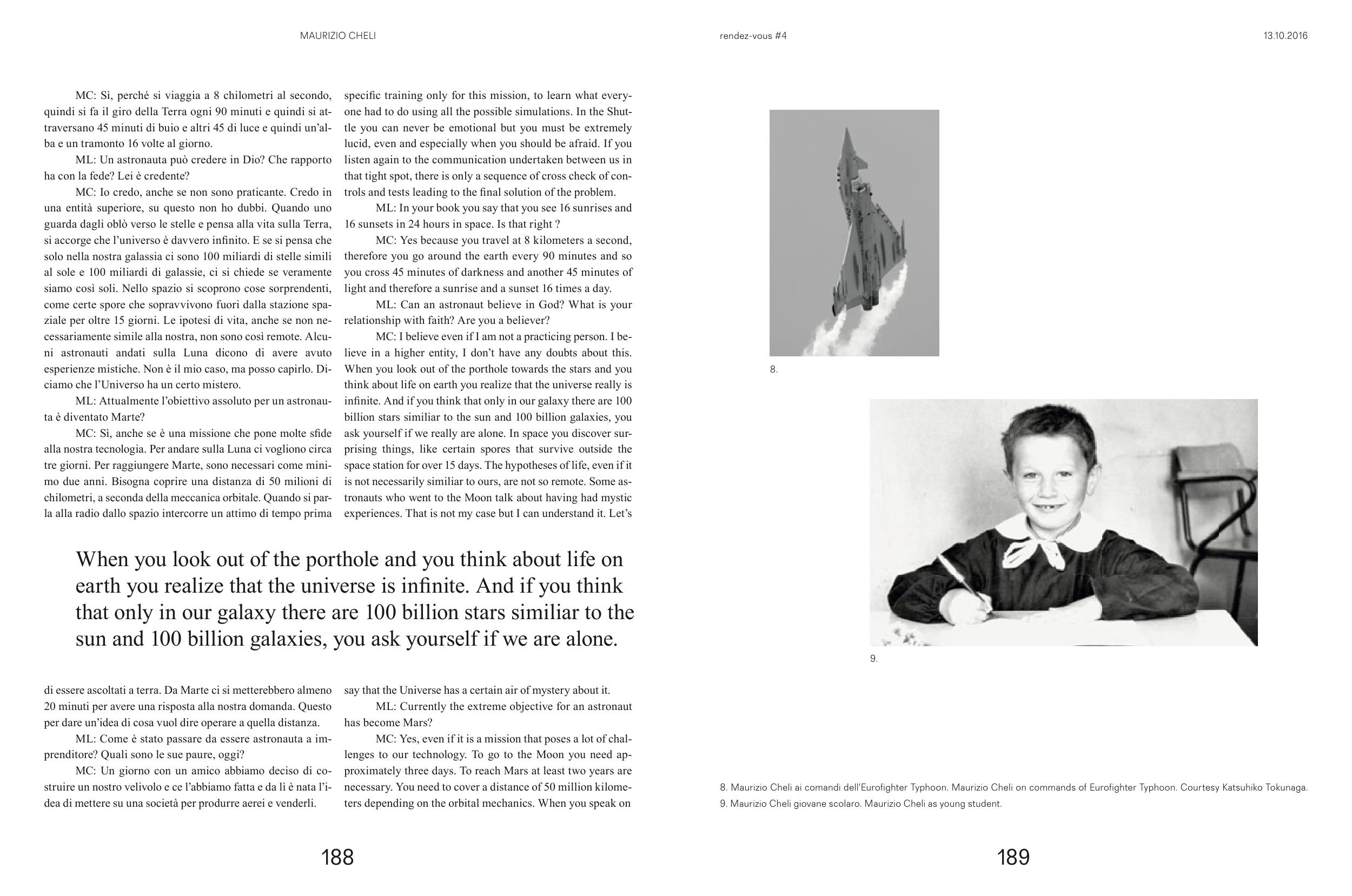188
189
specifi c training only for this mission, to learn what every-
one had to do using all the possible simulations. In the Shut-
tle you can never be emotional but you must be extremely
lucid, even and especially when you should be afraid. If you
listen again to the communication undertaken between us in
that tight spot, there is only a sequence of cross check of con-
trols and tests leading to the fi nal solution of the problem.
ML: In your book you say that you see 16 sunrises and
16 sunsets in 24 hours in space. Is that right ?
MC: Yes because you travel at 8 kilometers a second,
therefore you go around the earth every 90 minutes and so
you cross 45 minutes of darkness and another 45 minutes of
light and therefore a sunrise and a sunset 16 times a day.
ML: Can an astronaut believe in God? What is your
relationship with faith? Are you a believer?
MC: I believe even if I am not a practicing person. I be-
lieve in a higher entity, I don’t have any doubts about this.
When you look out of the porthole towards the stars and you
think about life on earth you realize that the universe really is
infi nite. And if you think that only in our galaxy there are 100
billion stars similiar to the sun and 100 billion galaxies, you
ask yourself if we really are alone. In space you discover sur-
prising things, like certain spores that survive outside the
space station for over 15 days. The hypotheses of life, even if it
is not necessarily similiar to ours, are not so remote. Some as-
tronauts who went to the Moon talk about having had mystic
experiences. That is not my case but I can understand it. Let’s
MC: Sì, perché si viaggia a 8 chilometri al secondo,
quindi si fa il giro della Terra ogni 90 minuti e quindi si at-
traversano 45 minuti di buio e altri 45 di luce e quindi un’al-
ba e un tramonto 16 volte al giorno.
ML: Un astronauta può credere in Dio? Che rapporto
ha con la fede? Lei è credente?
MC: Io credo, anche se non sono praticante. Credo in
una entità superiore, su questo non ho dubbi. Quando uno
guarda dagli oblò verso le stelle e pensa alla vita sulla Terra,
si accorge che l’universo è davvero infi nito. E se si pensa che
solo nella nostra galassia ci sono 100 miliardi di stelle simili
al sole e 100 miliardi di galassie, ci si chiede se veramente
siamo così soli. Nello spazio si scoprono cose sorprendenti,
come certe spore che sopravvivono fuori dalla stazione spa-
ziale per oltre 15 giorni. Le ipotesi di vita, anche se non ne-
cessariamente simile alla nostra, non sono così remote. Alcu-
ni astronauti andati sulla Luna dicono di avere avuto
esperienze mistiche. Non è il mio caso, ma posso capirlo. Di-
ciamo che l’Universo ha un certo mistero.
ML: Attualmente l’obiettivo assoluto per un astronau-
ta è diventato Marte?
MC: Sì, anche se è una missione che pone molte sfi de
alla nostra tecnologia. Per andare sulla Luna ci vogliono circa
tre giorni. Per raggiungere Marte, sono necessari come mini-
mo due anni. Bisogna coprire una distanza di 50 milioni di
chilometri, a seconda della meccanica orbitale. Quando si par-
la alla radio dallo spazio intercorre un attimo di tempo prima
When you look out of the porthole and you think about life on
earth you realize that the universe is infi nite. And if you think
that only in our galaxy there are 100 billion stars similiar to the
sun and 100 billion galaxies, you ask yourself if we are alone.
di essere ascoltati a terra. Da Marte ci si metterebbero almeno
20 minuti per avere una risposta alla nostra domanda. Questo
per dare un’idea di cosa vuol dire operare a quella distanza.
ML: Come è stato passare da essere astronauta a im-
prenditore? Quali sono le sue paure, oggi?
MC: Un giorno con un amico abbiamo deciso di co-
struire un nostro velivolo e ce l’abbiamo fatta e da lì è nata l’i-
dea di mettere su una società per produrre aerei e venderli.
say that the Universe has a certain air of mystery about it.
ML: Currently the extreme objective for an astronaut
has become Mars?
MC: Yes, even if it is a mission that poses a lot of chal-
lenges to our technology. To go to the Moon you need ap-
proximately three days. To reach Mars at least two years are
necessary. You need to cover a distance of 50 million kilome-
ters depending on the orbital mechanics. When you speak on
MAURIZIO CHELI
8.
9.
8. Maurizio Cheli ai comandi dell'Eurofighter Typhoon. Maurizio Cheli on commands of Eurofighter Typhoon. Courtesy Katsuhiko Tokunaga.
9. Maurizio Cheli giovane scolaro. Maurizio Cheli as young student.
13.10.2016
rendez-vous Δ4


